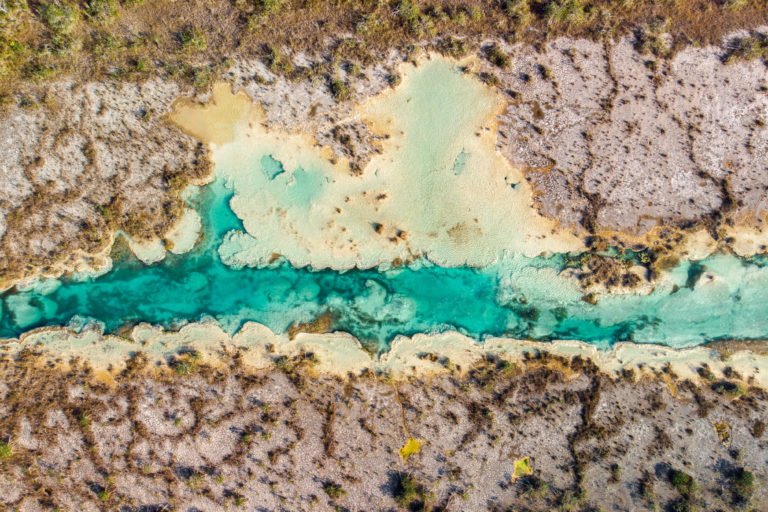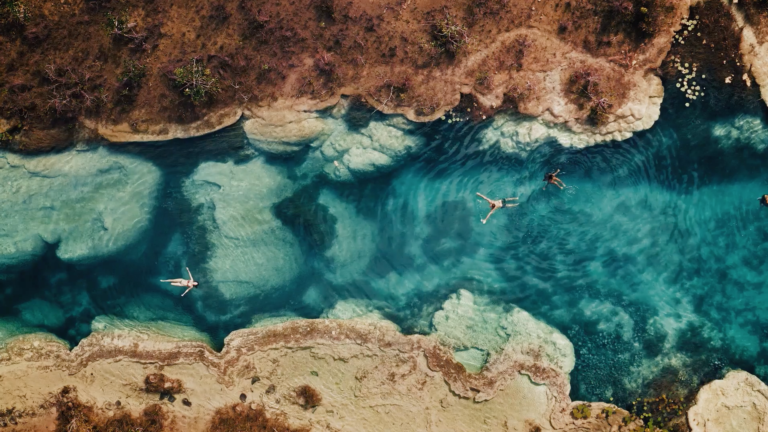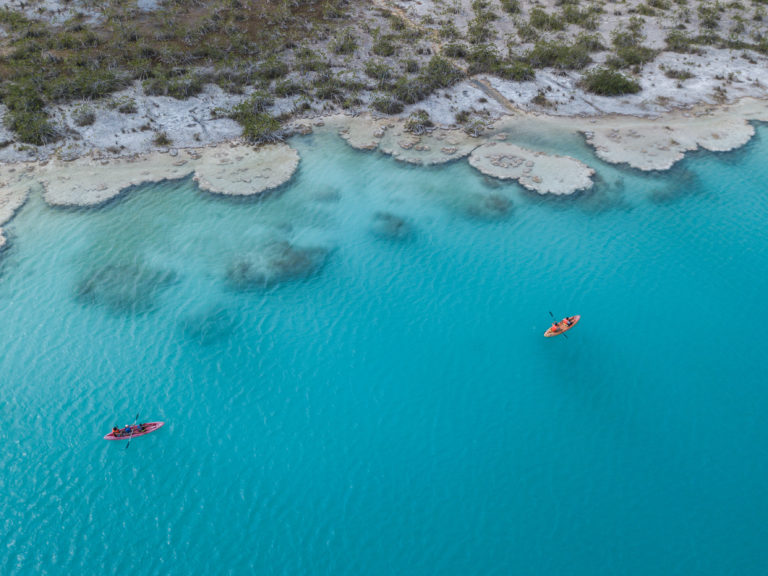Witnesses of Time
Nature teaches us to pay attention. In moments of calm, we can hear our planet sharing its invaluable teachings, asking us to connect to the rhythms of life. All around us, hidden in plain sight, are pieces of our Earth’s history telling stories of how we came to be. In Bacalar, wading in the lagoon’s crystalline waters, these stories can be found in microorganisms known as microbialites.
At first glance, microbialites resemble coral reef systems but are, in fact, made up of billions of microbes. Vital to Earth, these rock-like microorganisms invented photosynthesis and released oxygen over time, transforming our atmosphere and allowing life to exist as we know it today. Fossilized microbialites, known as stromatolites, are considered the oldest evidence of life on Earth, dating back 3.7 billion years.
To better understand these ancient organisms, we sat down with our Beyond Sustainability Director, Olmo Torres-Talamante, to learn more about the importance of microbialites in Bacalar and our ongoing initiatives to protect them.
Olmo explains that microbialites and stromatolites can be found in only a handful of places in the world, such as Australia, Chile, Brazil, Turkey, Canada, and Yellowstone National Park in the United States. In Mexico, microbialite reefs have been discovered in the Cuatro Cienegas desert of Coahuila, several crater lakes in Central Mexico, and certain coastal freshwater lagoons along the Yucatan Peninsula.
The natural beauty of Bacalar has long been the community’s driving force and source of peace. The Lagoon of Seven Colors is home to the world’s largest freshwater microbialite reef and a web of interconnected ecosystems and habitats, including mangroves, cenotes and tropical forests. Olmo tells us, “The beauty of the lagoon and its surrounding environments is Bacalar’s main attraction and economic engine. Therefore, the community as a whole must do everything possible to preserve this natural capital and balance the different economic activities so that they are harmonious with the ecosystems.”
Upon our arrival to the community of Bacalar, we took significant steps to ensure the preservation of the surrounding nature, especially the neighboring microbialites, when building our Home on the lagoon. Olmos says, “Habitas Bacalar was carefully designed with the microbialites in mind. All our structures are elevated on wooden beams, and our deck has a walkway to enter the water that goes over the microbialites without risk of touching them. Today, we have informative signs on the property and a QR code in our Welcome Letter that links to our Lagoon Care Guide. Additionally, all our staff is trained with detailed knowledge that can be shared with our guests.”
In Mexico, there are many contributing factors to the damage of microbialites, including poorly planned development, pollution from lack of sewage treatment, excess water usage and agricultural fertilizers. While government policies that regulate development are urgently needed to help save these diverse and ancient microbial reefs, other initiatives are taking the issues upon themselves. Olmo comments, “We have joined forces with Agua Clara, a non-profit organization, that since 2017 has been monitoring the water quality of the lagoon with ten parameters and in seven different locations.”
While monitoring water quality is an important safeguard, public education and outreach campaigns play an essential role in the long-term care of microbialites and the lagoon. Olmo says, “We are also part of the Messengers of the Mangrove campaign (Mensajeros del Manglar) that seeks to educate on the importance of mangroves for both the lagoon and microbialites. Mangroves and microbialites grow in a symbiosis that has not yet been studied by science.”
As a society, we always have a choice to improve and change. The actions of today are preserving the lagoon for tomorrow. When swimming in the lagoon, it is important to wear sun-protective clothing instead of using any kind of sunscreen and never touch, climb or step on the microbialites or stromatolites.
Now, more than ever, it is time to listen to what our planet has to tell us and take action for a more harmonious future. Alongside the community of Bacalar, we are committed to protecting the lagoon’s ecosystems and vow to be a keeper of their unparalleled wisdom.
We invite you to join us in supporting our present and future RISE Initiatives.



